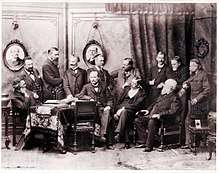Max Reischle
Max Wilhelm Theodore Reischle (18 June 1858 – 11 December 1905) was an Austrian-born German Protestant systematic theologian. He was born in Vienna, and died in Tübingen.

Spirituskreis (1902): Standing, left to right: Georg Wissowa, Eduard Meyer, Alois Riehl, Johannes Conrad, Carl Robert, Rudolf Stammler, Emil Kautzsch, Max Reischle.
In 1887 he received his doctorate at the University of Tübingen, later working as a professor at the Karlsgymnasium in Stuttgart (from 1889). In 1892 he was appointed a full professor of practical theology at the University of Giessen, then become a professor of systematic theology at the University of Göttingen (1895). During the following year, he accepted a call to Halle as chair of systematic theology.[1]
His studies largely dealt with mysticism in theology, the philosophy of religion and the transmission of ethical principles in academic instruction.[1]
Published works
- Die Frage nach dem Wesen der Religion. Grundlagen zu einer Methodologie der theologischen Wissenschaft (1889) – The question of the nature of religion. Foundations for a methodology of theological science.
- Der Glaube an Jesus Christus und die geschichtliche Erforschung seines Lebens (1893) – Faith in Jesus Christ and the historical study of his life.
- Christentum und Entwicklungsgedanke (1898).
- Christliche Glaubenslehre in Leitsätzen für eine akademische Vorlesung entwickelt (1899) – Christian doctrine as guidelines for academic lecture development.
- Werturteile und Glaubensurteile (1900) – Value and belief judgments.
- Die Bibel und das christliche Volksleben (1902).[1]
gollark: It could also be done without MS accounts.
gollark: It's probably so they can mildly simplify their backend and/or do data mining and/or prepare everyone for some Bedrock-style "marketplace" of badness.
gollark: By "new and improved" they mean "hahaha you will have a Microsoft account now, this is not optional".
gollark: https://www.minecraft.net/en-us/article/java-edition-moving-houseThis seems quite bad.
gollark: The "summon large amounts of bees riding sheep" bit is easy enough, but it's feeding into a "disapionator" outside the big triangular base there, and someone somehow rigged it to draw in bees, kill them when they get near a central thing, and produce cool particle effects while doing so.
References
- Max Reischle at Catalogus-professorum-halensis
External links
- Max Reischle at www.catalogus-professorum-halensis.de (German language)
This article is issued from Wikipedia. The text is licensed under Creative Commons - Attribution - Sharealike. Additional terms may apply for the media files.